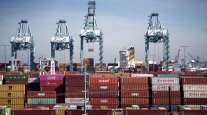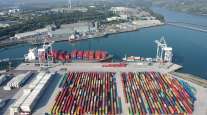Senior Reporter
Port Envoy Lyons Faces Logistics, Labor Challenges

[Stay on top of transportation news: Get TTNews in your inbox.]
The new federal port envoy said he is “very optimistic” about the progress being made to unkink the nation’s seaports and supply chain.
“The good news is the record volume of cargo, but the bad news is the record volume of cargo and we have nowhere to put it,” Stephen Lyons, a retired four-star U.S. Army general, said in a joint news conference with Port of Los Angeles Executive Director Gene Seroka on July 13.
“We still have work to do. We know this cannot be the new normal,” he added. “Cargo in motion should remain in motion until it gets to its destination, and terminals are not storage points or transit points and that’s why we have so many cartons out here.”
VIDEO: Retired Gen. Stephen R. Lyons, recently appointed Port and Supply Chain Envoy to the Biden-Harris Administration Supply Chain Disruptions Task Force, joins Port of Los Angeles Executive Director Gene Seroka to discuss current supply chain issues. https://t.co/4YOgwUNu1t pic.twitter.com/0gnPgUBUxC — Port of Los Angeles (@PortofLA) July 13, 2022
Lyons said the level of volatility and unreliability seen at the ports, railroads, shippers and trucking companies for the past 2½ years is not sustainable.
He spent 38 years in the Army, retiring in November 2021 as the 13th commander of U.S. Transportation Command, which he led for more than three years. He was appointed to the envoy position, within the U.S. Department of Transportation, on May 27. Lyons succeeds former Deputy Transportation Secretary John Porcari, who served less than a year.
He comes to his position facing a variety of challenges, including two potentially arduous labor negotiations and a series of new protests in California by independent truck drivers over the U.S. Supreme Court’s decision last month to not hear a challenge to the state’s controversial AB 5 law. The law will result in reclassification of what California Trucking Association says is an estimated 70,000 independent owner-operators to trucking company employees.

A trucker protests AB 5 at the Port of Long Beach, Calif., on July 13. (Bing Guan/Bloomberg News)
“We are tracking this very closely. This is now the law of the state of California. We are in the assessment phase,” Lyons said. “The truckers are so critical in this supply chain, and we have to make sure we have conditions to take care of them.”
The California Legislature passed AB 5 in 2019 as a way to regulate gig economy businesses such as Uber, Lyft and DoorDash. However many of those companies won exemptions.
“We’re in the early days of AB 5 based on its starting point, and we don’t know what the impacts will be,” Seroka said. “We have to attract, recruit and retain folks, and make this a profession once again.”
Truck drivers were protesting the new law at port facilities in Los Angeles and Long Beach on July 13.
The labor talks at issue involve the ongoing negotiations in San Francisco between the International Longshore and Warehouse Union (ILWU) and the Pacific Maritime Association (PMA) over a multiyear contract covering an estimated 22,000 port and warehouse workers at 29 locations on the West Coast.
July 1, 2022 Joint Statement from the International Longshore and Warehouse Union (ILWU) and the Pacific Maritime Association (PMA) 1/6 pic.twitter.com/MPGWw9q5sX — ILWU Coast Longshore Division (@ilwulongshore) July 1, 2022
The previous contract expired July 1, but union and management leaders say they will remain at the bargaining table and neither side intends to initiate a strike or lockout.
“The administration is watching as closely as they can be watched without being a point of interference — that would not be appropriate,” Lyons said. “I don’t think anyone expected that on the first of July there would be a contract. That’s not how it works, and there’s a lot of hard work going on in San Francisco.”
Want more news? Listen to today's daily briefing above or go here for more info
Another labor protest that officials are watching closely involves the International Brotherhood of Locomotive Engineers and Trainmen, which who voted 99.5% to authorize a strike July 18 against the freight railroads.
The union and the railroads have been at the bargaining table since January 2020 with wages and health care benefits being the major points of discussion.
The National Mediation Board, which mediates labor disputes among the railroads and airlines, became involved earlier this year but talks remain at an impasse. A 30-day cooling off period imposed by the board expires July 18.




